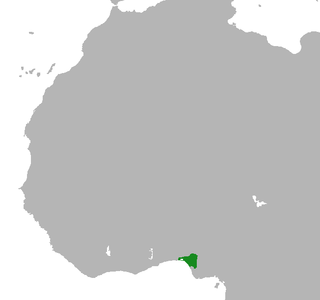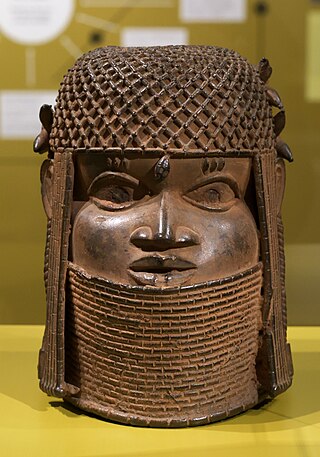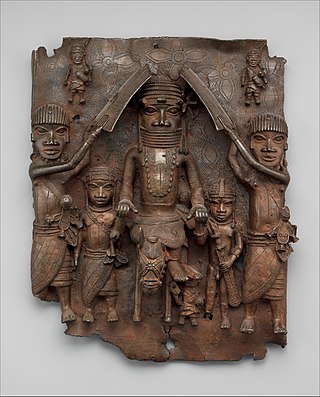Related Research Articles

The Oba of Benin is the traditional ruler and the custodian of the culture of the Edo people and all Edoid people. The then Kingdom of Benin has continued to be mostly populated by the Edo.
Chief Jacob Uwadiae Egharevba (1893–1981) was a Bini historian and traditional chief whose writings specialized in the history of Benin Kingdom.

Ewuare, originally known as Prince Ogun, was the twelfth Oba of the Benin Empire from 1440 until 1473. Ewuare became king in a violent coup against his brother Uwaifiokun which destroyed much of Benin City. After the war, Ewuare rebuilt much of the city of Benin, reformed political structures in the kingdom, greatly expanded the territory of the kingdom, and fostered the arts and festivals. He left a significant legacy in the Kingdom of Benin

The Kingdom of Benin, also known as Great Benin or Benin Kingdom is a kingdom within what is now considered southern Nigeria. It has no historical relation to the modern republic of Benin, which was known as Dahomey from the 17th century until 1975. The Kingdom of Benin's capital was Edo, now known as Benin City in Edo State, Nigeria. The Benin Kingdom was one of the oldest and most developed states in the coastal hinterland of West Africa. It grew out of the previous Edo Kingdom of Igodomigodo around the 11th century AD; it was annexed by the British Empire in 1897.

The Akure Kingdom is a traditional state with headquarters in Akure, Ondo State, Nigeria. It is the successor to an ancient Yoruba city state of the same name. The ruler bears the title "Deji of Akure".
The Kingdom of Ugu is a kingdom that exists in Nigeria, in what is now Edo State. The Edo State is also called Benin, though it is not to be confused with the country. The Kingdom of Ugu originated out of Igodomigodo in Nigeria.
Unuamen also spelt Unuame is an ancient village community by Ovia river in Ovia North-East Local Government Area of Edo State, Nigeria. Unuame is about 15 kilometres (9 mi) from Benin City and 20 kilometres (12 mi) from Benin Airport. Unuame is one of the ancestral homes of Oba Esigie's maternal grandfather and home town to some group of Binis. The people of Unuame have remained loyal to the monarch since the establishment of the ancient Kingdom of Benin. Being a part of the Kingdom of Benin, Unuame is at the heart of the tropical rainforest in the southern part of Nigeria, way to the west of the delta of the Niger River and inland from the coast.

Oguola was the fifth Oba of the Benin Kingdom, reigning from 1280 AD to 1295 AD. His reign was marked by achievements in fortifying the city of Benin, enhancing its defences, and contributing to the cultural and economic development of the kingdom. Born into the royal family, Oguola's ascent to the throne was prompted by the extended absence of his elder brother, Prince Obuobu, who was engaged in military campaigns. This unorthodox succession was a pragmatic decision by the kingdom's elders and advisors to ensure stability and effective leadership during a critical period.
Eweka I was the first Oba of Benin and presided over the kingdom's shift from the Ogiso Dynasty to the establishment of the Obaship. His 35-year reign had a notable impact on the political, cultural, and traditional aspects of the kingdom. Before Eweka I's rule, the Benin Kingdom faced uncertainty due to the banishment of Owodo, the last Ogiso, for misrule. Oduduwa, who was the father of Oromiyan had been exiled to Uhe (Ife), which eventually set the stage for Eweka I's ascension to power. The turning point occurred when Oduduwa sent his son, Oromiyan, to Benin as an emissary. Oromiyan's arrival was met with resistance, leading to his settlement in Usama, on the outskirts of Benin City.
Ogbebo was the thirty-second Oba who ruled the Benin Empire in 1816 AD, albeit for a brief period. His time in power was marked by a contest for control of the Benin throne, leading to a civil conflict.

Osemwende, originally known as Prince Eredia-uwa, was the thirty-third Oba of Benin who reigned from c. 1816 AD – c. 1848 AD. He was the son of Oba Obanosa and the brother of Ogbebo, whom he defeated in a civil war to claim the throne. He restored peace and stability to the kingdom after a turbulent period of succession crisis and expanded and consolidated his empire through military conquests and diplomatic alliances. He also promoted trade and commerce with foreign nations, especially the Portuguese, and fostered art and learning among his people. He was revered as a wise and benevolent ruler who brought good tidings to his kingdom.
The Battle of Ekiokpagha was a military conflict that took place in 1255 on the Plains of Ogboka, near Benin City. Its designation as a battle is a mere historical formality as there was no fighting, but Ewedo's forces killed Chief Oliha, a senior ally of Ogiamien. The battle was fought between Ewedo, the recently coronated Oba of Benin, and Ogiamien III, the head of a royal family in the Benin Empire who disputed his claim to the throne. Oba Ewedo was victorious and established his palace at the site of the battle. Ewedo recognised Ogiamien III as a chief under his kingship.
Uwakhuahen was the second Oba of the Kingdom of Benin, reigning from 1235 AD to 1243 AD. He was the son of Eweka I, the initiator of the Oba dynasty and the inaugural ruler to bear the title Oba. Upon the demise of his father, he ascended to the throne, although he did not designate an heir apparent.

Orhogbua was the seventeenth Oba of the Benin Kingdom who reigned around c. 1550 AD – c. 1578 AD. He was the son of Esigie and the grandson of Ozolua. Orhogbua was educated in a Portuguese colonial school and was baptised as a Catholic. He was able to communicate in Portuguese, both spoken and written. He established a military camp on Lagos Island, which served as a strategic location for empire expansion and trade control. He also introduced the use of native cooking salt in Benin.

Ehengbuda served as the eighteenth Oba of the Benin Empire, with a reign from c. 1578 AD – c. 1606 AD. Succeeding his father, Orhogbua, the first Oba to initiate contact with Europeans, Ehengbuda expanded the empire's territory westward and eastward, solidifying control over tributary states like the Oyo, Ekiti and Nupe. He also engaged in diplomacy and trade with the Portuguese and English, acquiring gifts such as a telescope. His death in a maritime storm while returning from a visit to his colony in Lagos marked the end of the era of warrior kings in Benin history, as the subsequent Obas delegated the command of the military to their chiefs.

Olua was the fourteenth Oba of Benin who reigned from c. 1473 AD – c. 1480 AD. He was the second child of Ewuare. Olua's reign is noted for his actions and the establishment of the Itsekiri kingdom through his son Iginuwa.

Ohen was the eighth Oba (monarch) of the Benin Kingdom, who ruled from c. 1334 AD – c. 1370 AD. He was the son and successor of Oba Oguola, who had conquered the Ekiti and Akure kingdoms and built the first moat around Benin City. He expanded the Benin Empire to the west and east, and increased its control over several tributary states. He also interacted with the Portuguese and the English, and received gifts such as a telescope from them.

Egbeka was the ninth Oba of Benin, ruling from 1370 AD to 1400 AD. He was the eldest son of Oba Ohen and took over the throne after his father's death.

Ewuakpe was the twenty-sixth Oba of Benin. Originally known as Idova, he was enthroned following his father Akenuzama's abdication due to old age. His ascension was intended to circumvent a prophecy by Ewuare the Great that foretold governmental upheaval under an Oba named Idova. However, his early rule faced resistance, with key figures and the general populace of Benin distancing themselves from palace activities and ceasing to provide necessary support for its operations. This led Ewuakpe to depart from Benin City and reside in Ikoka, the village of his mother, where he experienced additional adversity and engaged in humble tasks. The root of this widespread disapproval was traced back to a violent act he ordered during his mother's funeral. In a time of hardship, Ewuakpe sought the chiefs' support through traditional music and entreaty. A significant shift occurred when Iden, his spouse, consented to a ritual sacrifice to the gods, which resulted in the restoration of Ewuakpe's authority. This act influenced the chiefs to reaffirm their loyalty, thereby reinstating Ewuakpe's leadership. Following this event, Ewuakpe initiated reforms and strengthened his hold on power, which had a lasting impact on the kingdom's governance.
Uwa was the twenty-fifth Ogiso of the Kingdom of Igodomigodo, an early state that later became part of the Benin Empire. He was the son of Ogiso Odoligie and ruled during a period of political transformation shaped by earlier reforms. His reign saw the expansion of the Benin monarchy’s influence from the River Oroghodo in the east to the River Ohosu in the west. He ordered the expulsion of the nobleman Ovio, an event that led to migrations affecting present-day Delta and Anambra.
References
Citations
- 1 2 3 4 5 6 7 8 9 Egharevba 1968, p. 33.
- 1 2 Forman, Forman & Dark 1960, p. 32.
- 1 2 Egharevba 1968, p. 34.
- 1 2 Osadolor 2001, p. 144–145.
- 1 2 3 4 5 Duchâteau 1994, p. 20.
- ↑ Osadolor 2001, p. 128.
Bibliography
- Egharevba, Jacob U. (1968). A Short History of Benin. Ibadan University Press. ISBN 978-978-121-239-0.
- Forman, W.; Forman, B.; Dark, P.J.C. (1960). Benin Art (in German). P. Hamlyn. Retrieved 12 February 2024.
- Osadolor, Osarhieme Benson (2001). The military system of Benin kingdom, c. 1440-1897=Das Militärsystem des Königreichs Benin, ca. 1440–1897 (Thesis). University of Hamburg. OCLC 248739742.
- Duchâteau, Armand (1994). Benin: Royal Art of Africa from the Museum Für Völkerkunde, Vienna. München New York: Museum of Fine Arts, Houston. ISBN 978-3-7913-1368-9 . Retrieved 12 February 2024.